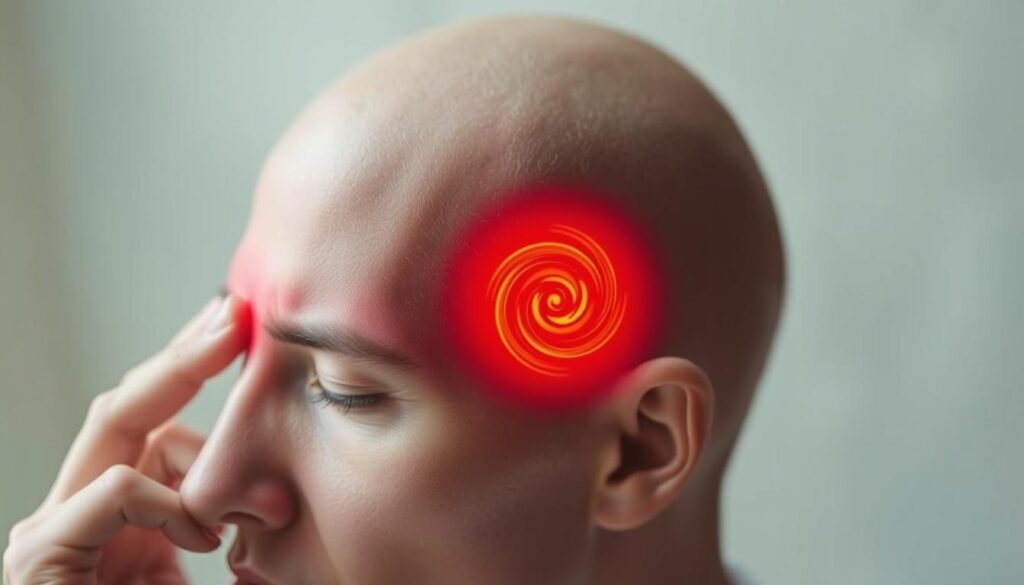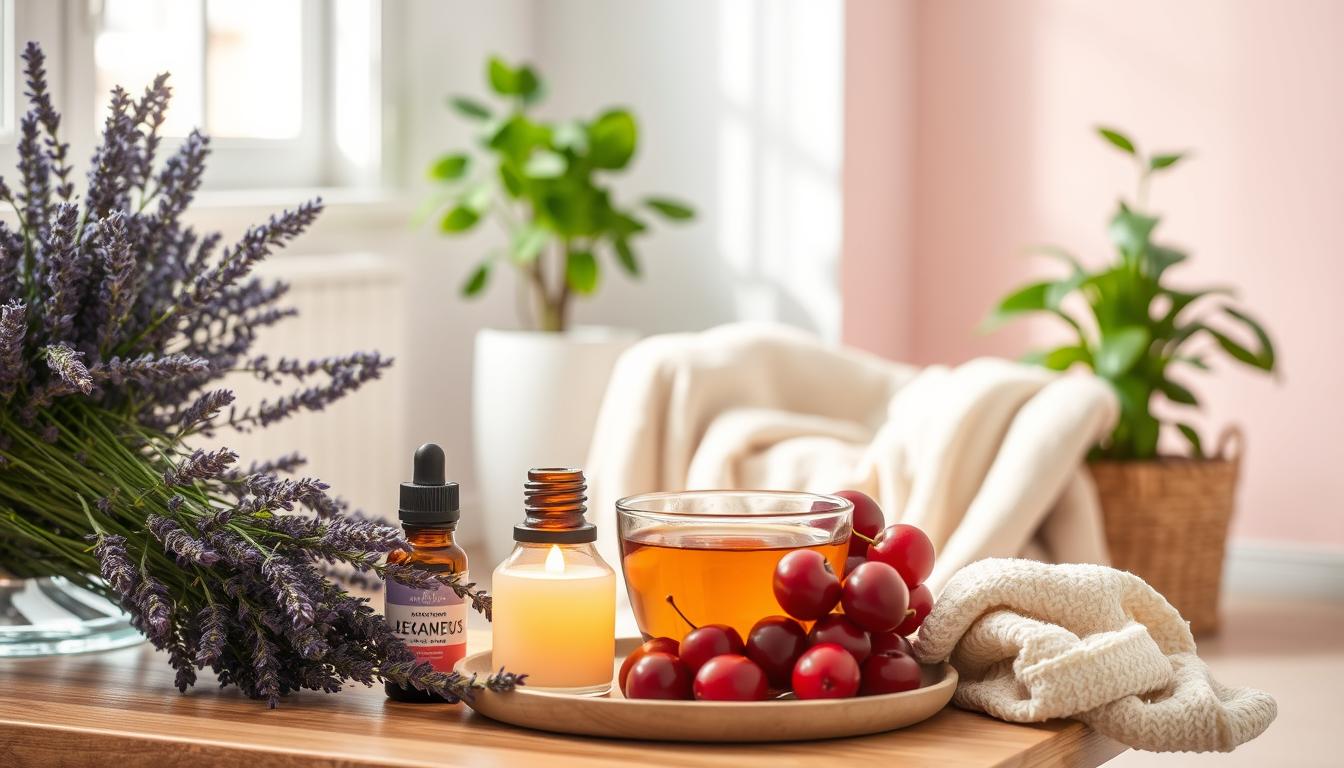Migraines can be debilitating, disrupting your daily life and leaving you searching for relief. Fortunately, there are several natural remedies that can help alleviate migraine pain without relying on medication. This comprehensive guide explores ten effective, holistic approaches to managing migraines, from essential oils and dietary changes to stress-reducing techniques and lifestyle adjustments.
Key Takeaways
- Discover 10 natural ways to find relief from migraine pain
- Explore the power of essential oils and aromatherapy for migraine management
- Learn acupressure and massage techniques to target migraine pressure points
- Understand the impact of hydration, nutrition, and dietary changes on migraines
- Discover the benefits of herbal remedies and supplements for migraine prevention
- Incorporate stress management and relaxation techniques into your routine
- Prioritize sleep hygiene for improved migraine prevention
Understanding Migraines: Beyond the Common Headache
Migraines are much more than just a typical headache. They are a complex neurological condition that can have a significant impact on an individual’s daily life. Unlike regular headaches, migraines often come with a unique set of symptoms and triggers that can make them particularly debilitating.
Common Migraine Triggers and Symptoms
Migraines can be triggered by a variety of factors, including stress, hormonal changes, certain foods, and changes in sleep patterns. Common migraine symptoms include severe, throbbing head pain, sensitivity to light and sound, nausea, and in some cases, visual disturbances known as aura.
The impact of migraines on daily life can be severe. Individuals experiencing a migraine attack may find it difficult to perform routine tasks, participate in social activities, or even maintain a healthy work-life balance. The pain and other symptoms can be so intense that they can disrupt an individual’s entire day.
“Migraines are not just bad headaches – they are a complex neurological condition that can have a significant impact on an individual’s quality of life.”
Understanding the unique nature of migraines is the first step in finding effective migraine remedies and natural headache relief. By recognizing the common triggers and symptoms, individuals can better manage their condition and explore alternative migraine therapies that may provide the relief they need.

Essential Oils and Aromatherapy for Migraine Relief
If you’re seeking natural ways to relieve migraines, essential oils and aromatherapy can be powerful allies. These potent plant-derived compounds are known for their ability to alleviate various health conditions, including the debilitating symptoms of migraines.
Peppermint oil, for instance, is a popular choice for herbal migraine treatments. Its menthol content can help soothe muscle tension and improve blood flow, potentially reducing the severity of migraine pain. Lavender oil, on the other hand, is renowned for its calming and stress-reducing properties, which can be particularly beneficial for those whose migraines are triggered by anxiety or emotional stress.
Eucalyptus oil is another non-pharmacological migraine aid that may help alleviate migraine symptoms. Its anti-inflammatory and analgesic (pain-relieving) properties can provide a natural remedy for the throbbing, pulsing sensations associated with migraines.
| Essential Oil | Potential Benefits for Migraines |
|---|---|
| Peppermint | Reduces muscle tension, improves blood flow |
| Lavender | Calms the mind, reduces stress and anxiety |
| Eucalyptus | Reduces inflammation, provides pain relief |
When using essential oils for migraine relief, it’s important to follow proper application methods, such as diffusing the oils or applying them topically to the temples, forehead, or neck. Consulting with a healthcare professional can also help ensure the safe and effective use of these natural ways to relieve migraines.

“The use of essential oils for migraine relief has gained significant attention in recent years, with growing scientific evidence supporting their potential benefits.”
As with any natural remedy, it’s essential to consider individual sensitivities and potential interactions with existing medications or health conditions. By incorporating the power of essential oils and aromatherapy into their migraine management plan, individuals can explore non-pharmacological migraine aids that may provide much-needed relief and improved quality of life.
Acupressure and Massage Techniques
For those seeking alternative migraine therapies, acupressure and massage can be powerful drug-free tools for managing migraines. By targeting specific pressure points and employing soothing self-massage techniques, you can find natural headache relief and better control your migraine symptoms.
Pressure Points for Quick Relief
Certain acupressure points on the body are believed to provide quick migraine relief. Some key pressure points include:
- The base of the skull, where the neck meets the head
- The webbing between the thumb and index finger
- The inner wrist, four fingers down from the base of the palm
Gently massaging these areas with your fingers or using a tool like a massage roller can help relax tense muscles and stimulate the body’s natural pain-relieving responses.
Self-Massage Methods for Migraine Management
In addition to targeting specific pressure points, incorporating regular self-massage into your migraine management routine can be highly beneficial. Techniques like temple massages, scalp massages, and shoulder rubs can help relieve muscle tension and promote relaxation. Experiment with different self-massage methods to find what works best for your individual needs.
When to Seek Professional Massage Therapy
While self-massage can be an effective drug-free migraine therapy, there are times when seeking the expertise of a professional massage therapist may be advantageous. For chronic or severe migraines, or if you’re unable to find relief through self-care alone, booking a session with a licensed massage therapist can provide more targeted and intensive treatment. They can identify trigger points, incorporate specialized techniques, and develop a personalized plan to address your unique migraine symptoms.

Incorporating acupressure, self-massage, and professional massage therapy into your natural headache relief regimen can be a powerful way to manage migraines and find the drug-free relief you seek.
Dietary Changes That Prevent Migraines
Migraines can be a debilitating condition, but incorporating natural, holistic solutions into your lifestyle can make a significant difference. One effective approach is to focus on dietary changes that prevent migraines. By understanding and avoiding common food triggers, as well as incorporating migraine-fighting foods, you can take proactive steps to manage your condition and find natural ways to relieve migraines.
Certain foods and additives have been identified as potential migraine triggers. Processed foods, artificial sweeteners, aged cheeses, and foods high in nitrates or MSG are among the culprits that can contribute to migraine attacks. By eliminating or reducing the consumption of these items, you may experience a decrease in the frequency and severity of your migraines.
On the other hand, incorporating migraine-fighting foods into your diet can provide natural relief. Foods rich in magnesium, riboflavin, and omega-3 fatty acids, such as leafy greens, nuts, and fatty fish, have been shown to have a positive impact on migraine management.
| Migraine-Triggering Foods | Migraine-Fighting Foods |
|---|---|
|
|
By making these dietary changes, you can take a proactive approach to managing your migraines. Incorporating migraine-relieving lifestyle changes, such as a migraine-friendly diet, can be a powerful holistic solution to finding natural ways to relieve migraines.

“Eating a balanced, nutrient-rich diet can be a game-changer in the management of migraines. By avoiding potential triggers and embracing migraine-fighting foods, you can find natural, holistic ways to prevent and relieve these debilitating headaches.”
Natural Ways to Relieve Migraines Through Hydration and Nutrition
Maintaining proper hydration and a migraine-friendly diet are essential components of natural headache relief. By focusing on these two key areas, you can effectively manage and even prevent those debilitating migraine episodes.
Optimal Hydration Strategies
Dehydration is a common migraine trigger, so ensuring you stay properly hydrated is crucial. Aim to drink at least 8 glasses of water per day, and more if you’re active or live in a hot climate. Carry a reusable water bottle with you throughout the day as a constant reminder to sip regularly.
In addition to plain water, herbal teas and infused waters can also contribute to your daily hydration needs. Fruits like watermelon, oranges, and grapes are high in water content and can help you stay hydrated as well.
Migraine-Fighting Foods
- Leafy greens: Packed with essential vitamins and minerals, leafy greens like spinach and kale can help reduce inflammation and ease migraine pain.
- Fatty fish: Omega-3 fatty acids in fish like salmon and mackerel have potent anti-inflammatory properties that can provide natural headache relief.
- Ginger: This aromatic root contains compounds that can help suppress the triggers that lead to migraine attacks.
- Turmeric: The active compound curcumin in turmeric is a powerful antioxidant with strong anti-inflammatory effects.
- Almonds: Rich in magnesium, almonds can help relax blood vessels and ease migraine symptoms.
Incorporating these migraine-fighting foods into your regular diet can make a significant difference in managing your headaches through natural means.
By prioritizing proper hydration and a nutrient-rich diet, you can harness the power of nature to provide natural headache relief and prevent future migraine episodes.
The Power of Herbal Remedies and Supplements
When it comes to finding natural ways to relieve migraines, herbal remedies and supplements have long been a popular choice. From centuries-old traditional practices to modern scientific research, these natural treatments offer a promising solution for those seeking herbal migraine treatments and natural ways to relieve migraines.
One of the most well-known herbal remedies for migraines is feverfew. This unassuming little plant has been used for centuries to manage the symptoms of migraines, thanks to its anti-inflammatory properties. Butterbur is another herbal extract that has shown promise in reducing the frequency and severity of migraines, likely due to its ability to block the release of certain chemicals that trigger the condition.
In addition to these traditional herbal remedies, non-pharmacological migraine aids such as magnesium supplements have also been studied for their potential in alleviating migraine symptoms. Magnesium plays a crucial role in regulating neurotransmitters and blood vessel function, making it a natural fit for natural ways to relieve migraines.
“Herbal remedies and supplements offer a gentle, yet effective, approach to managing migraine symptoms without the potential side effects of prescription medications.”
It’s important to note that while these herbal migraine treatments and natural solutions can be beneficial, it’s always best to consult with a healthcare professional before starting any new supplement regimen. They can provide guidance on the appropriate dosages and potential interactions with any existing medications or conditions.
By incorporating the power of herbal remedies and supplements into your migraine management plan, you can take a more holistic and natural approach to finding relief and improving your overall well-being.
Stress Management and Relaxation Techniques
Managing stress is crucial for those seeking effective, drug-free migraine management. By incorporating various relaxation techniques into your daily routine, you can harness the power of your mind and body to alleviate the symptoms of migraines and prevent future occurrences. Explore the benefits of meditation, mindfulness practices, and breathing exercises as alternative migraine therapies.
Meditation and Mindfulness Practices
Mindfulness and meditation have been shown to be effective holistic migraine solutions. These practices can help reduce stress, improve focus, and promote a sense of calm, all of which can have a positive impact on migraine management. Start with just a few minutes of meditation per day, focusing on your breath and being present in the moment. Gradually increase the duration as you become more comfortable with the practice.
Breathing Exercises for Pain Relief
Controlled breathing techniques can be a powerful tool in the arsenal of drug-free migraine management. Simple exercises, such as the 4-7-8 method or box breathing, can help calm the mind, relax the body, and alleviate migraine pain. Incorporate these breathing exercises into your daily routine, and use them as needed during the onset of a migraine episode to find quick relief.
| Breathing Exercise | Description | Benefits |
|---|---|---|
| 4-7-8 Method | Inhale for 4 seconds, hold for 7 seconds, exhale for 8 seconds. | Reduces stress, lowers blood pressure, and promotes relaxation. |
| Box Breathing | Inhale for 4 seconds, hold for 4 seconds, exhale for 4 seconds, hold for 4 seconds. | Calms the mind, improves focus, and can provide quick relief for migraines. |
By incorporating these stress management and relaxation techniques into your lifestyle, you can take a proactive approach to drug-free migraine management and find holistic solutions to address this debilitating condition.
“Stress can be a major trigger for migraines, so finding effective ways to manage it is crucial for those seeking alternative migraine therapies.”
Sleep Hygiene and Migraine Prevention
Achieving quality, restorative sleep is a crucial component of any migraine-relieving lifestyle changes. Consistent sleep patterns can significantly reduce the frequency and severity of migraines, offering a natural path to relief. By establishing healthy sleep habits and creating an optimal sleep environment, you can harness the power of your body’s natural rhythms to better manage your migraines.
One of the most effective natural ways to relieve migraines is to prioritize a consistent sleep schedule. Aim for 7-9 hours of sleep each night, going to bed and waking up at the same time, even on weekends. This regularity helps regulate your circadian rhythm, which can in turn prevent the sleep disturbances that often trigger migraine episodes.
In addition to a consistent sleep schedule, creating a soothing sleep sanctuary is key. Ensure your bedroom is cool, dark, and quiet, free from disruptive lights and sounds. Experiment with relaxing home remedies for migraines, such as essential oils or gentle white noise, to further enhance your sleep environment and promote deep, restorative slumber.





